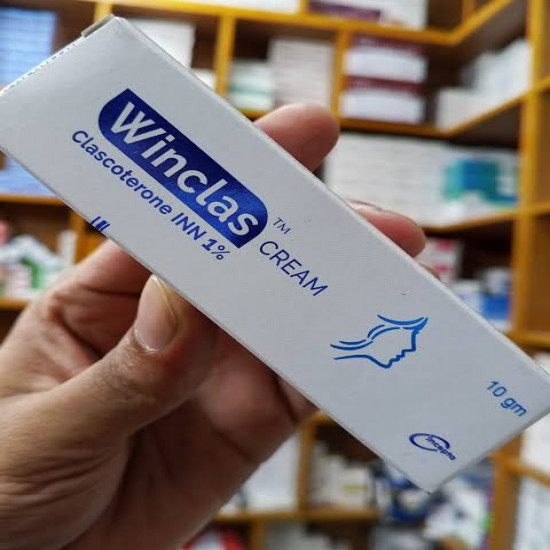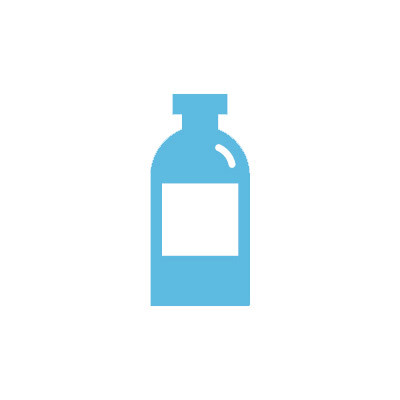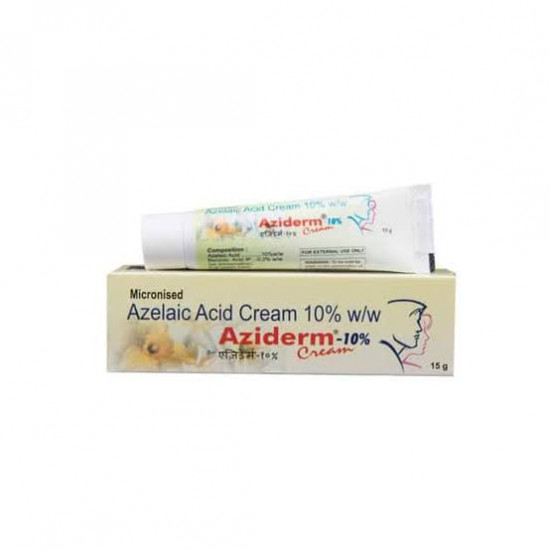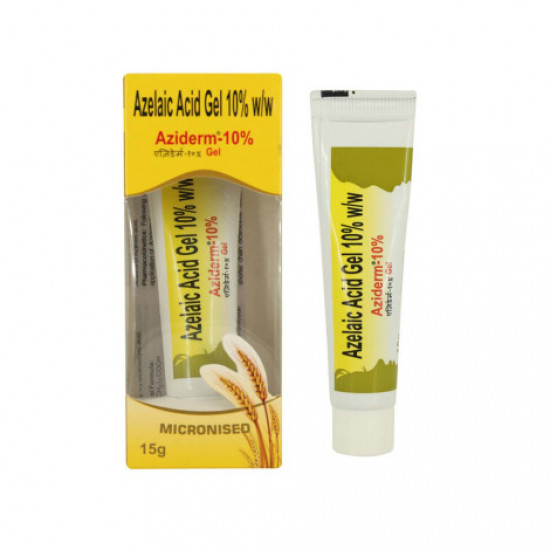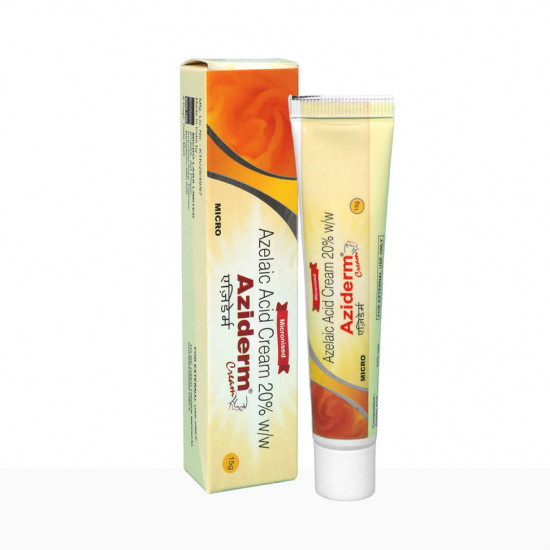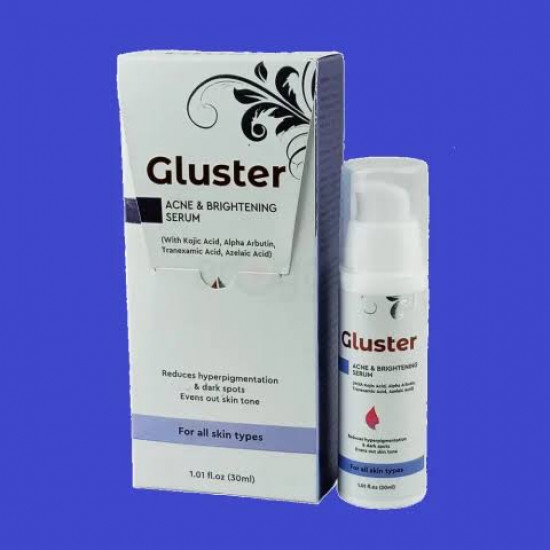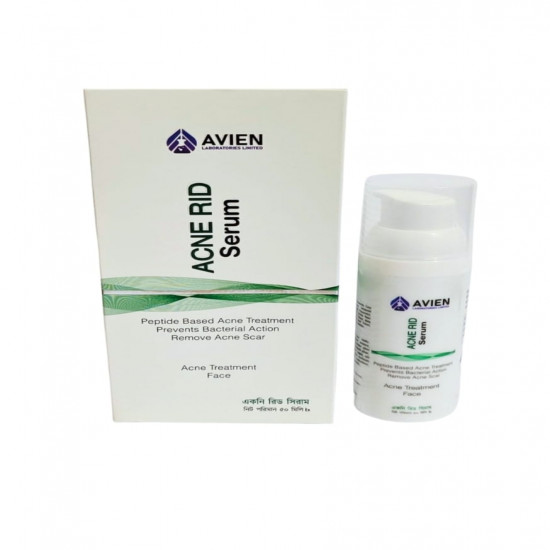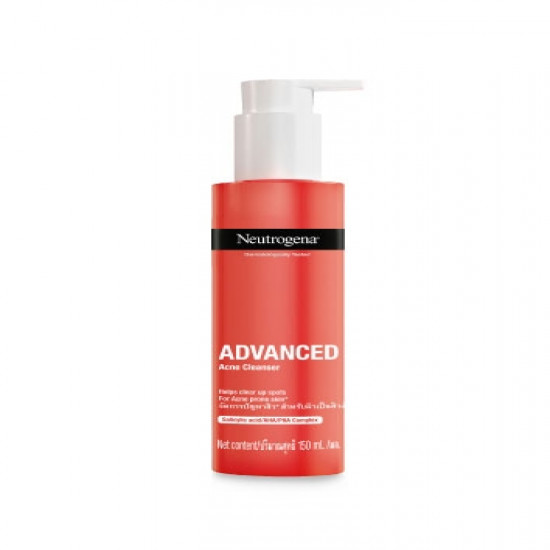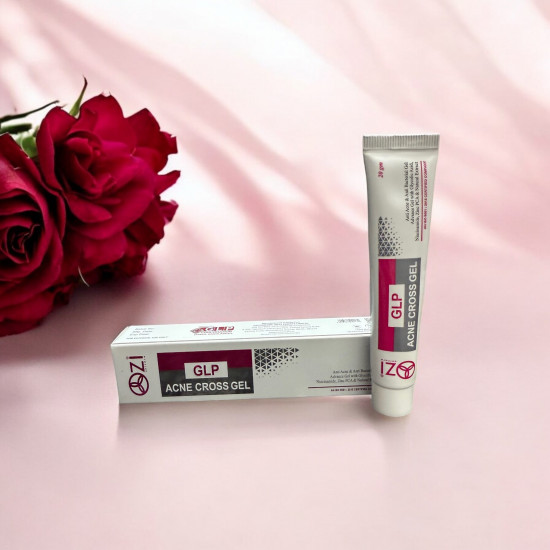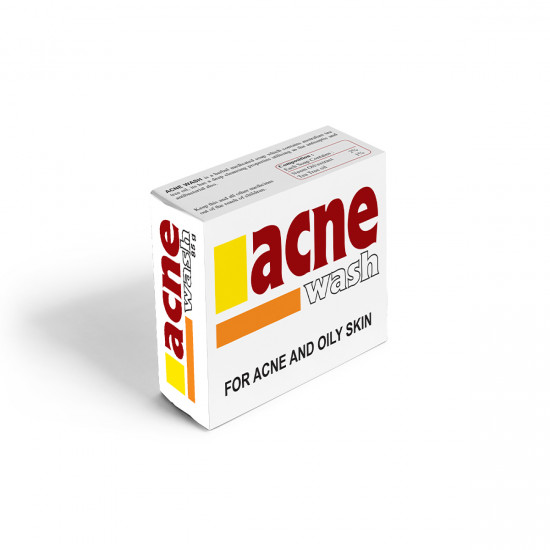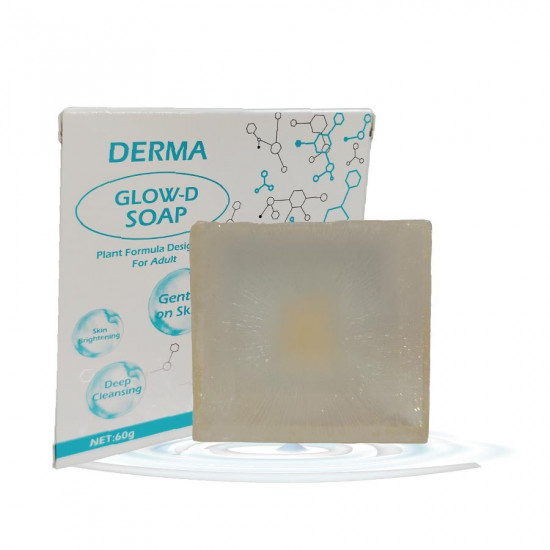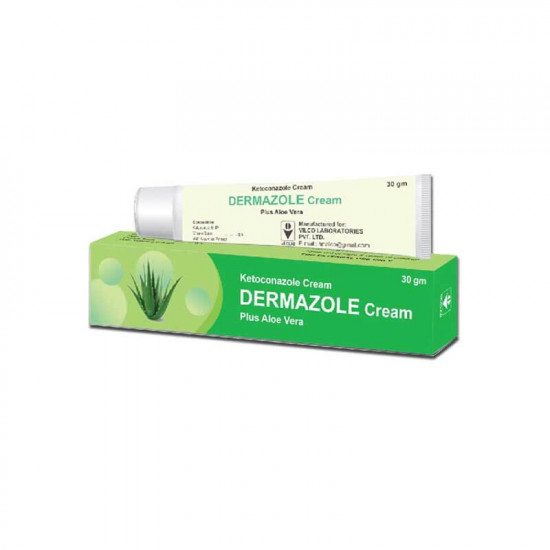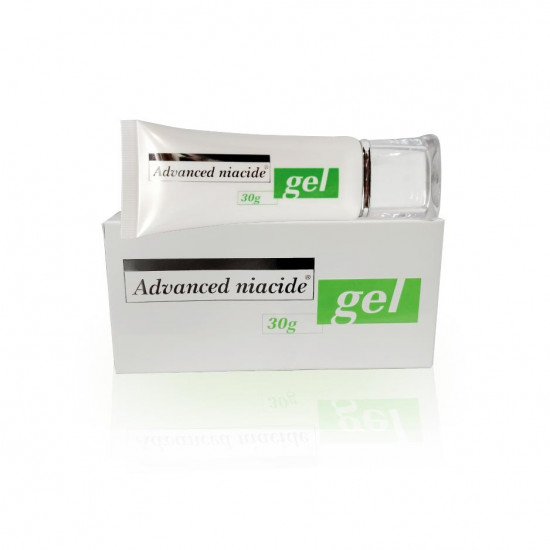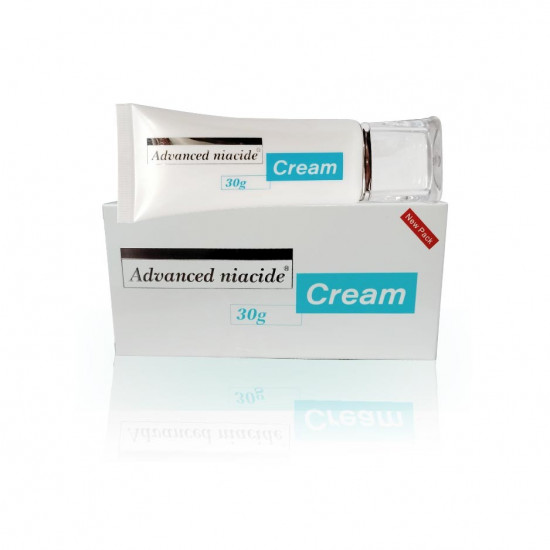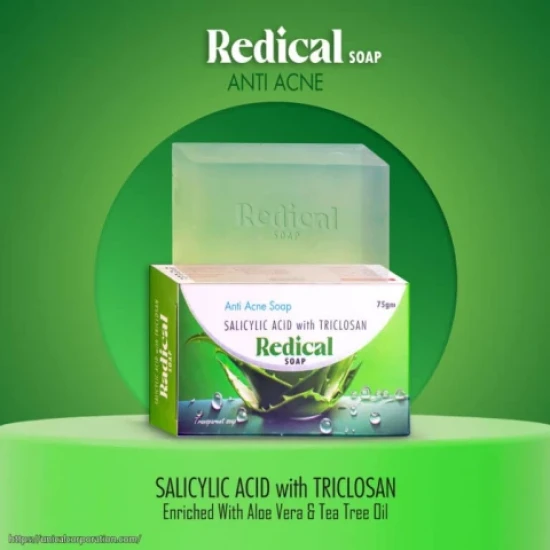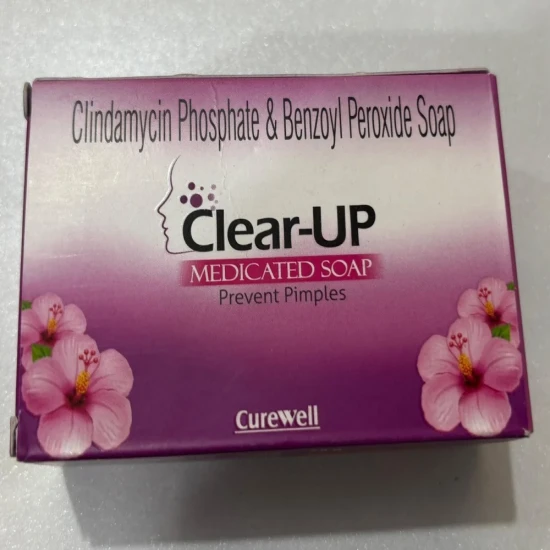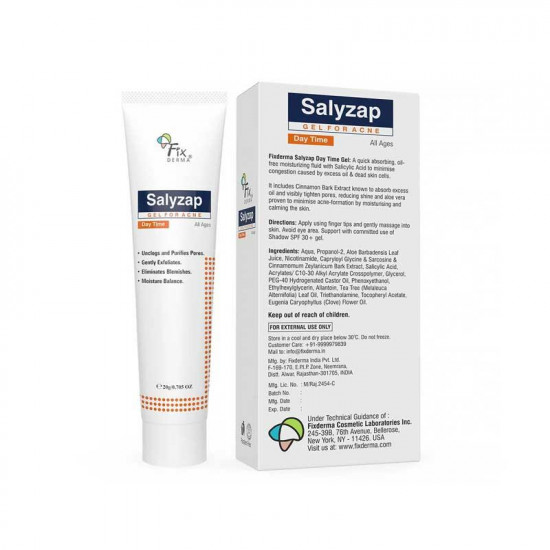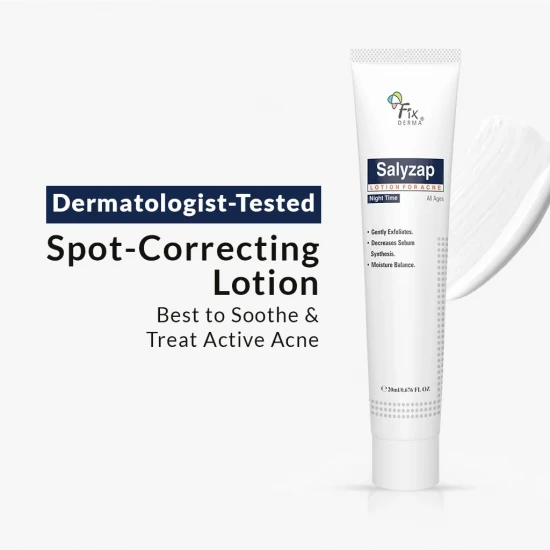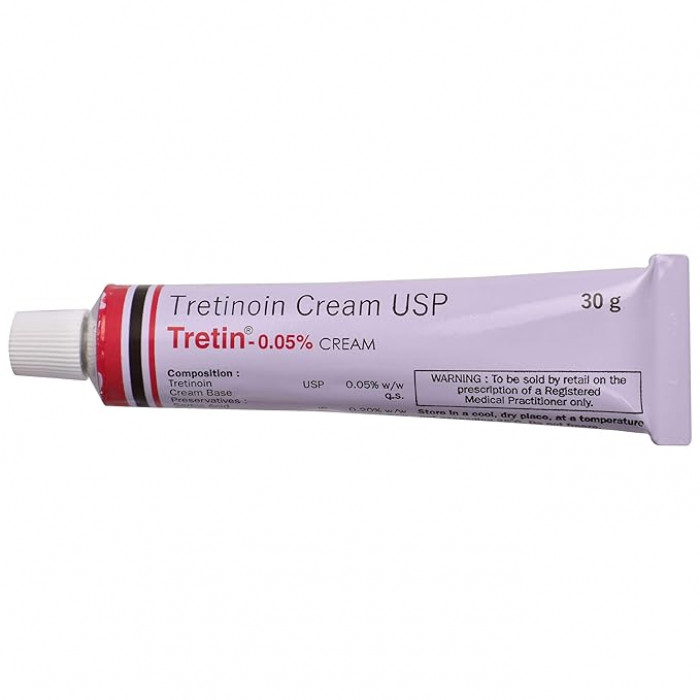
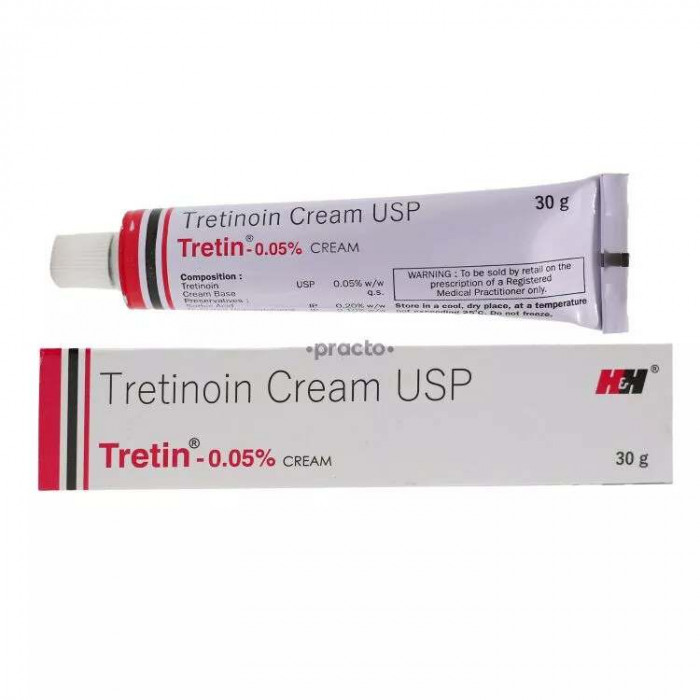
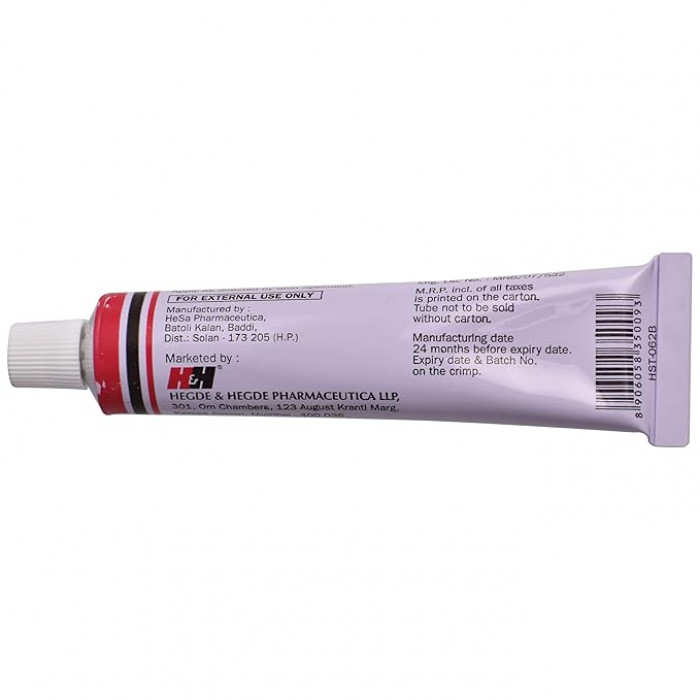
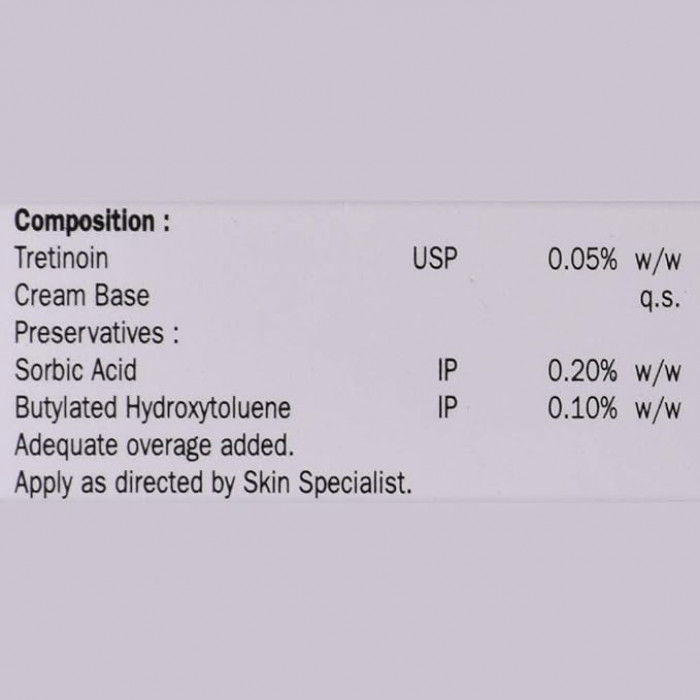
✔ 100% Authentic Product
👁️ Currently Viewing 7584
Tretinoin Tretin Cream 0.05%
- Tretin Cream 0.05% is used to treat acne, wrinkles, skin spots, and rough skin.

Discount
Price: ৳ 679
MRP:
৳
799
15%
Off

100% Genuine Products, Guaranteed

Safe & Secure Payments, Always

Fast, Secure & Efficient Delivery

Proper Packaging
 Cash on Delivery - All over Bangladesh
Cash on Delivery - All over Bangladesh Regular Delivery - 12-24 Hours, Dhaka City* Charge Tk.39-59
Regular Delivery - 12-24 Hours, Dhaka City* Charge Tk.39-59 Regular Delivery - 24-48 Hours, Other Cities* Charge Tk.99-110
Regular Delivery - 24-48 Hours, Other Cities* Charge Tk.99-110
🌙 রমযান অফার 🌙
 ফ্রি ডেলিভারিঃ - ৭৯৯ টাকা+ অর্ডারে, ঢাকা
শহরে
ফ্রি ডেলিভারিঃ - ৭৯৯ টাকা+ অর্ডারে, ঢাকা
শহরে ফ্রি ডেলিভারিঃ - ২৭৯৯ টাকা+ অর্ডারে, ঢাকার
বাহিরে
ফ্রি ডেলিভারিঃ - ২৭৯৯ টাকা+ অর্ডারে, ঢাকার
বাহিরে
📲 মোবাইল অ্যাপ অর্ডারে সাশ্রয় বেশী
-
Google Play Store থেকে ডাউনলোড
-
Apple Store থেকে ডাউনলোড
100% Genuine Products, Guaranteed
Safe & Secure Payments, Always
Fast, Secure & Efficient Delivery
Proper Packaging
 Cash on Delivery - All over Bangladesh
Cash on Delivery - All over Bangladesh Regular Delivery - 12-24 Hours, Dhaka City* Charge Tk.39-59
Regular Delivery - 12-24 Hours, Dhaka City* Charge Tk.39-59 Regular Delivery - 24-48 Hours, Other Cities* Charge Tk.99-110
Regular Delivery - 24-48 Hours, Other Cities* Charge Tk.99-110 ফ্রি ডেলিভারিঃ - ৭৯৯ টাকা+ অর্ডারে, ঢাকা
শহরে
ফ্রি ডেলিভারিঃ - ৭৯৯ টাকা+ অর্ডারে, ঢাকা
শহরে ফ্রি ডেলিভারিঃ - ২৭৯৯ টাকা+ অর্ডারে, ঢাকার
বাহিরে
ফ্রি ডেলিভারিঃ - ২৭৯৯ টাকা+ অর্ডারে, ঢাকার
বাহিরে- Google Play Store থেকে ডাউনলোড
- Apple Store থেকে ডাউনলোড
🌙 রমযান অফার 🌙
📲 মোবাইল অ্যাপ অর্ডারে সাশ্রয় বেশী
✅ Description:
- Tretin Cream 0.05%, a form of vitamin A, is utilized to treat acne by addressing spots or pimples on the face, chest, or back. It also aids in smoothing rough facial skin and reducing fine wrinkles.
- Tretinoin, the active ingredient, works by reducing excessive oil production in the skin. It is typically applied as a thin layer, with pinpoint application at nighttime recommended.
- Clean and dry the affected area before applying the cream. Avoid applying it to damaged or broken skin and prevent contact with the mouth, eyes, and nose. Follow the doctor's instructions regarding application duration and frequency.
- It may take several weeks for symptoms to improve. Consistent and regular application is essential for optimal results. Using more than prescribed does not expedite improvement and may increase side effects.
- Mild side effects such as skin irritation, dryness, and redness are common. These often improve as the body adjusts to the medication. Drink water and use moisturizer to counter dryness. Serious side effects are rare.
- Tretinoin may increase sensitivity to sunlight. Limit sun exposure and use sunscreen. Waxing and laser treatments are not recommended during Tretinoin use due to increased skin fragility.
Safety Advices

Alcohol
UNSAFE
The interaction of alcohol with Tretin Cream 0.05% is unknown. Please consult a doctor before consuming alcohol while using Tretin Cream 0.05%.

Pregnancy
CONSULT YOUR DOCTOR
Tretin Cream 0.05% is not recommended for use during pregnancy unless necessary. The risks and benefits should be discussed with your doctor before using this medicine.

Breastfeeding
CONSULT YOUR DOCTOR
Tretin Cream 0.05% is not recommended for use while breastfeeding unless necessary. The risks and benefits should be discussed with your

Driving
SAFE
Tretin Cream 0.05% usually does not affect your ability to drive or operate machinery.

Kidney
CONSULT YOUR DOCTOR
If you have any concerns regarding the use of Tretin Cream 0.05% 30 gm in patients with kidney problems, please consult a doctor.

Liver
CONSULT YOUR DOCTOR
If you have any concerns regarding the use of Tretin Cream 0.05% in patients with liver problems, please consult a doctor.

Alcohol
UNSAFE
The interaction of alcohol with Tretin Cream 0.05% is unknown. Please consult a doctor before consuming alcohol while using Tretin Cream 0.05%.

Pregnancy
CONSULT YOUR DOCTOR
Tretin Cream 0.05% is not recommended for use during pregnancy unless necessary. The risks and benefits should be discussed with your doctor before using this medicine.

Breastfeeding
CONSULT YOUR DOCTOR
Tretin Cream 0.05% is not recommended for use while breastfeeding unless necessary. The risks and benefits should be discussed with your

Driving
SAFE
Tretin Cream 0.05% usually does not affect your ability to drive or operate machinery.

Kidney
CONSULT YOUR DOCTOR
If you have any concerns regarding the use of Tretin Cream 0.05% 30 gm in patients with kidney problems, please consult a doctor.

Liver
CONSULT YOUR DOCTOR
If you have any concerns regarding the use of Tretin Cream 0.05% in patients with liver problems, please consult a doctor.
✔️ Uses of Tretin Cream 0.05%
Acne (is a skin condition that occurs when your hair follicles become plugged with oil and dead skin cells causing blackheads, whiteheads, or pimples)
✔️ How does Tretin Cream 0.05% work?
It works by clearing skin pores and preventing the formation of spots or pimples.
✔️ Side Effects of Tretin Cream 0.05%
- Erythema (skin redness)
- Skin irritation
- Dry skin
- Dry lips
- Pale red skin
- Increased sensitivity to light
✔️ Quick Suggestions:
- Avoid sun exposure while using the cream.
- Wear protective clothing.
- Use sunscreen to protect the skin from sunburn.
- Regular exercise can improve mood and self-esteem but doesn't directly clear acne.
- Shower after exercise to prevent sweat-related irritation.
- Regularly wash hair and keep it from falling across the face.
- Use water-based cosmetic products.
- Remove makeup completely before bedtime.
- Apply the cream in the prescribed amounts to avoid adverse effects.
- Avoid squeezing spots or attempting to clean blackheads to prevent worsening and scarring.
✔️ Indications:
Tretinoin, the active ingredient in Tretin 0.05% Cream, is indeed a form of vitamin A. It is widely used in dermatology for the treatment of acne and other skin conditions. Tretinoin works by affecting the growth of skin cells, promoting the turnover of cells in the skin's outer layer. This helps to keep pores clear and prevent the formation of acne lesions such as blackheads, whiteheads, and pimples.
In addition to its acne-fighting properties, Tretinoin has been found to have beneficial effects on reducing the appearance of fine wrinkles and improving the overall texture and appearance of the skin. It is often used as an anti-aging treatment.
✔️ Pharmacology
Reduction in Cohesiveness:
- Tretinoin reduces the cohesiveness of follicular epithelial cells. This means that the cells lining the hair follicles are less likely to stick together excessively.
Microcomedo Formation:
- Microcomedones are the precursor lesions of acne, and the reduction in their development is a key aspect of Tretinoin's action.
Stimulation of Mitotic Activity:
- Tretinoin stimulates mitotic activity, which refers to the process of cell division. This increased cell division contributes to the overall renewal and turnover of cells in the affected area.
Acceleration of Turnover:
- The turnover of follicular epithelial cells is increased. This means that older cells are replaced more rapidly by newer cells. This process aids in the removal of comedones, papules, and pustules.
✔️ Dosage & Administration:
- Apply sparingly to the entire affected area once or twice daily.
- Cleanse the skin thoroughly before application.
- Dry the skin before applying the cream.
- Patients should be aware that it may take 6 to 8 weeks of treatment before a therapeutic effect is observed.
- Moisturizers and cosmetics may be used during treatment, but they should not be applied to the skin at the same time as Tretinoin cream.
- Astringent toiletries should be avoided.
✔️ Interaction
Alcohol Interaction:
- Description: Interaction with alcohol is unknown.
- Instructions: Consult your doctor before consumption.
Medicine Interactions:
- Benzoyl Peroxide (Topical)
- Salicylic Acid
Disease Interactions:
Eczema:
- Tretin 0.05% Cream should be avoided if you have eczematous skin as it may cause skin irritation.
Sunburn:
- If you have sunburn, the use of Tretin 0.05% Cream may cause extreme irritation.
✔️ Uses of Tretin Cream 0.05%
Acne (is a skin condition that occurs when your hair follicles become plugged with oil and dead skin cells causing blackheads, whiteheads, or pimples)
✔️ Which Tretinoin is better?
The choice between Tretinoin 0.05% and 0.025% depends on various factors, including your skin type, concerns, and sensitivity. Here are some considerations:
Treatment Purpose:
- 0.025% Strength: Generally considered milder and is often used for more sensitive skin or individuals new to retinoid therapy. It's suitable for addressing mild to moderate acne, fine lines, and overall skin texture improvement.
- 0.05% Strength: Stronger than 0.025%, it is often prescribed for moderate acne and can be more effective for anti-aging purposes, including reducing the appearance of wrinkles and fine lines.
Skin Sensitivity:
- If you have sensitive skin or are new to retinoids, starting with Tretinoin 0.025% may be a more prudent choice. This allows your skin to acclimate to the retinoid with potentially fewer side effects.
Side Effects:
- The higher the concentration, the more potential for side effects like dryness, redness, and peeling. If you experience irritation with 0.05%, you may consider trying a lower concentration.
Consultation with a Dermatologist:
- It's advisable to consult with a dermatologist to determine the most suitable strength based on your skin's specific needs and your skincare goals.
Remember, when incorporating Tretinoin into your skincare routine:
- Start Gradually: Begin with less frequent applications, such as every other night, and gradually increase frequency as your skin tolerates it.
- Sun Protection: Always use a broad-spectrum sunscreen during the day as retinoids can increase sensitivity to sunlight.
- Moisturize: Consider using a moisturizer to help alleviate potential dryness associated with retinoid use.
✔️ How does Tretin Cream 0.05% work?
It works by clearing skin pores and preventing the formation of spots or pimples.
✔️ Contraindications
Should not be used on eczema or sunburned skin.
✔️ Side Effects of Tretin Cream 0.05%
- Erythema (skin redness)
- Skin irritation
- Dry skin
- Dry lips
- Pale red skin
- Increased sensitivity to light
✔️ Pregnancy & Lactation
he safety of topically applied Tretinoin during pregnancy is not well-established, and caution is advised. While it's primarily associated with teratogenicity (the potential to cause birth defects) when administered systemically, meaning taken internally, the topical application may still carry some risks.
✔️ Quick Suggestions:
- Avoid sun exposure while using the cream.
- Wear protective clothing.
- Use sunscreen to protect the skin from sunburn.
- Regular exercise can improve mood and self-esteem but doesn't directly clear acne.
- Shower after exercise to prevent sweat-related irritation.
- Regularly wash hair and keep it from falling across the face.
- Use water-based cosmetic products.
- Remove makeup completely before bedtime.
- Apply the cream in the prescribed amounts to avoid adverse effects.
- Avoid squeezing spots or attempting to clean blackheads to prevent worsening and scarring.
✔️ Precautions & Warnings
- Inform your doctor if you are allergic to tretinoin or any other medicines.
- If you experience skin irritation, redness, burning, or a stinging sensation at the application site, stop using the cream and consult a doctor.
- Consult your doctor if you are pregnant, planning for pregnancy, or nursing before using the cream.
- Avoid sun exposure.
- Use sunscreen and wear protective clothing when going out, as the cream may increase sensitivity to the sun.
- Do not apply the cream in large amounts, as it may cause peeling, redness, or discomfort.
- Use caution when using the cream with medicated or abrasive soaps, cleansers, shampoos, astringents, products with high alcohol concentrations, electrolysis, hair depilatories, waxes, or topical medications, as they may increase skin irritation.
✔️ Indications:
Tretinoin, the active ingredient in Tretin 0.05% Cream, is indeed a form of vitamin A. It is widely used in dermatology for the treatment of acne and other skin conditions. Tretinoin works by affecting the growth of skin cells, promoting the turnover of cells in the skin's outer layer. This helps to keep pores clear and prevent the formation of acne lesions such as blackheads, whiteheads, and pimples.
In addition to its acne-fighting properties, Tretinoin has been found to have beneficial effects on reducing the appearance of fine wrinkles and improving the overall texture and appearance of the skin. It is often used as an anti-aging treatment.
✔️ Storage Conditions
Keep out of children's reach. Keep cool and dry, and keep away from direct sunlight.
✔️ Pharmacology
Reduction in Cohesiveness:
- Tretinoin reduces the cohesiveness of follicular epithelial cells. This means that the cells lining the hair follicles are less likely to stick together excessively.
Microcomedo Formation:
- Microcomedones are the precursor lesions of acne, and the reduction in their development is a key aspect of Tretinoin's action.
Stimulation of Mitotic Activity:
- Tretinoin stimulates mitotic activity, which refers to the process of cell division. This increased cell division contributes to the overall renewal and turnover of cells in the affected area.
Acceleration of Turnover:
- The turnover of follicular epithelial cells is increased. This means that older cells are replaced more rapidly by newer cells. This process aids in the removal of comedones, papules, and pustules.
✔️ Dosage & Administration:
- Apply sparingly to the entire affected area once or twice daily.
- Cleanse the skin thoroughly before application.
- Dry the skin before applying the cream.
- Patients should be aware that it may take 6 to 8 weeks of treatment before a therapeutic effect is observed.
- Moisturizers and cosmetics may be used during treatment, but they should not be applied to the skin at the same time as Tretinoin cream.
- Astringent toiletries should be avoided.
✔️ Interaction
Alcohol Interaction:
- Description: Interaction with alcohol is unknown.
- Instructions: Consult your doctor before consumption.
Medicine Interactions:
- Benzoyl Peroxide (Topical)
- Salicylic Acid
Disease Interactions:
Eczema:
- Tretin 0.05% Cream should be avoided if you have eczematous skin as it may cause skin irritation.
Sunburn:
- If you have sunburn, the use of Tretin 0.05% Cream may cause extreme irritation.
✔️ Which Tretinoin is better?
The choice between Tretinoin 0.05% and 0.025% depends on various factors, including your skin type, concerns, and sensitivity. Here are some considerations:
Treatment Purpose:
- 0.025% Strength: Generally considered milder and is often used for more sensitive skin or individuals new to retinoid therapy. It's suitable for addressing mild to moderate acne, fine lines, and overall skin texture improvement.
- 0.05% Strength: Stronger than 0.025%, it is often prescribed for moderate acne and can be more effective for anti-aging purposes, including reducing the appearance of wrinkles and fine lines.
Skin Sensitivity:
- If you have sensitive skin or are new to retinoids, starting with Tretinoin 0.025% may be a more prudent choice. This allows your skin to acclimate to the retinoid with potentially fewer side effects.
Side Effects:
- The higher the concentration, the more potential for side effects like dryness, redness, and peeling. If you experience irritation with 0.05%, you may consider trying a lower concentration.
Consultation with a Dermatologist:
- It's advisable to consult with a dermatologist to determine the most suitable strength based on your skin's specific needs and your skincare goals.
Remember, when incorporating Tretinoin into your skincare routine:
- Start Gradually: Begin with less frequent applications, such as every other night, and gradually increase frequency as your skin tolerates it.
- Sun Protection: Always use a broad-spectrum sunscreen during the day as retinoids can increase sensitivity to sunlight.
- Moisturize: Consider using a moisturizer to help alleviate potential dryness associated with retinoid use.
✔️ Contraindications
Should not be used on eczema or sunburned skin.
✔️ Pregnancy & Lactation
he safety of topically applied Tretinoin during pregnancy is not well-established, and caution is advised. While it's primarily associated with teratogenicity (the potential to cause birth defects) when administered systemically, meaning taken internally, the topical application may still carry some risks.
✔️ Precautions & Warnings
- Inform your doctor if you are allergic to tretinoin or any other medicines.
- If you experience skin irritation, redness, burning, or a stinging sensation at the application site, stop using the cream and consult a doctor.
- Consult your doctor if you are pregnant, planning for pregnancy, or nursing before using the cream.
- Avoid sun exposure.
- Use sunscreen and wear protective clothing when going out, as the cream may increase sensitivity to the sun.
- Do not apply the cream in large amounts, as it may cause peeling, redness, or discomfort.
- Use caution when using the cream with medicated or abrasive soaps, cleansers, shampoos, astringents, products with high alcohol concentrations, electrolysis, hair depilatories, waxes, or topical medications, as they may increase skin irritation.
✔️ Storage Conditions
Keep out of children's reach. Keep cool and dry, and keep away from direct sunlight.
⚠️Disclaimer:
At ePharma, we’re committed to providing accurate and accessible health information. However, all content is intended for informational purposes only and should not replace medical advice from a qualified physician. Please consult your healthcare provider for personalized guidance. We aim to support, not substitute, the doctor-patient relationship.




